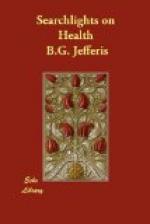7. She must not, on any account, force down—as her female friends or as a “pottering” old nurse may advise—to “grinding pains”; if sue does, it will rather retard than forward her labor. 8. During this stage, she had better walk about or sit down, and not confine herself to bed; indeed, there is no necessity for her, unless she particularly desire it, to remain in her chamber.
9. After an uncertain length of time, the pains alter in character. From being “grinding” they become “bearing down,” and more regular and frequent, and the skin becomes both hot and perspiring. These may be considered the true labor-pains. The patient ought to bear in mind then that “true labor-pains” are situated in the back, and loins; they come on at regular intervals, rise gradually up to a certain pitch of intensity, and abate as gradually; it is a dull, heavy, deep sort of pain, producing occasionally a low moan from the patient; not sharp or twinging, which would elicit a very different expression of suffering from her.
10. Labor—and truly it maybe called, “labor.” The fiat has gone forth that in “sorrow thou shalt bring forth children.” Young, in his “Night Thoughts,” beautifully expresses the common lot of women to suffer:
“’Tis the common lot; in this shape, or in that, has fate entailed The mother’s throes on all of women born, Not more the children than sure heirs of pain.”
[Illustration]
[Illustration: LOVE OF HOME.]
* * * * *
SPECIAL SAFEGUARDS IN CONFINEMENT.
1. Before the confinement takes place everything should be carefully arranged and prepared. The physician should be spoken to and be given the time as near as can be calculated. The arrangement of the bed, bed clothing, the dress for the mother and the expected babe should be arranged for convenient and immediate use.
2. A bottle of sweet oil, or vaseline, or some pure lard should be in readiness. Arrangements should be made for washing all soiled garments, and nothing by way of soiled rags or clothing should be allowed to accumulate.
3. A rubber blanket, or oil or waterproof cloth should be in readiness to place underneath the bottom sheet to be used during labor.
4. As soon as labor pains have begun a fire should be built and hot water kept ready for immediate use. The room should be kept well ventilated and comfortably warm.
5. No people should be allowed in or about the room except the nurse, the physician, and probably members of the family when called upon to perform some duty.
6. During labor no solid food should be taken; a little milk, broth or soup may be given, provided there is an appetite. Malt or spirituous liquors should be carefully avoided. A little wine, however, may be taken in case of great exhaustion. Lemonade, toast, rice water, and tea may be given when desired. Warm tea is considered an excellent drink for the patient at this time.




